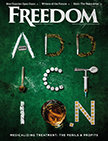Vol. 47, Issue 3 ‣ editorial
Poop & Scoop

At some point in your journey, you’ve probably been wrongly accused. It was likely over something small, inconsequential in the grand scheme—like I was not too long ago. I moved recently, to a “dead-tech, post-modernistic bullshit” condo building in Hollywood (taking from the description Al Pacino’s character waged at his wife’s ex-husband’s house in the 1995 film Heat), with my teenage daughter and our little dog too—a Chihuahua. The building houses a dozen lofts, all of which share an expanse of sidewalk spanning the façade. This is an image-conscious building—not just because it’s in Hollywood, or because two major film studios abut it. My immediate neighbor is an interior designer who conducts business out of the live/work space, and—in an unrelated incident—replaced our doormat so that it would match his.
About two weeks after I moved in, I went to check the mail and there was a nasty, passive-aggressive note posted above the building’s boxes. The upshot was that someone was pissed off that they were encountering tiny piles of dog poop on the shared sidewalk out front. It derisively screamed in thick black Sharpie: “Pick up after your little dog, whoever you are! (Gee I wonder if it’s the new tenant?)” Me.
But it wasn’t me. How I know is a long story, and not relevant here—but it wasn’t. Unfortunately, the note-writer assuming it was me was entirely justified in thinking so—it made sense. What are the chances some other little mutt would start leaving “presents” at just the time I moved in with my Chihuahua? If I tried to explain to my new neighbors that—hey, I know it looks bad, but this isn’t my dog—I’d only succeed in looking shifty. In their shoes, I wouldn’t believe me either. Standing there in front of the mailbox, I turned deep purple, ripped down the note, and skulked back inside. I was in a bad mood for the rest of the afternoon, into that evening, and deeply self-conscious for the next few days when I walked to my car in the building’s shared garage, and whenever I happened to encounter a neighbor.
But a week later, I’d largely forgotten the whole thing. And, after a few more weeks, when the little piles of poop stopped appearing, fingering me—I forgot about it completely.
But it’s easy to summon the terrible feeling I had standing there, frozen with mail key in hand: displaced guilt, baseless shame, shame at feeling shamed, for caring what other people thought about me when it was not true—shame that radiated into an indignant, biting rage that clutched at my chest, leaving me burning and breathless at the notion that no matter what I said or did, and no matter how innocent of this “crime” I was, people were always going to think it had been me. That sense of injustice is a singular kind of horror—it was just awful.
And I’ll bet you know the feeling exactly.
Now, imagine for a moment it wasn’t leaving dog poop on the sidewalk you were wrongly accused of, or whatever petty thing this type of iniquity has stricken you over, but a terrible crime: robbery, murder, infanticide. And the consequences weren’t just in your head, the blow not only to your pride: you were looking at spending the rest of your life in prison, a death sentence—for something you didn’t do.
That is what faced the folks we meet in Actual Innocence. Thank goodness we can also report that exonerations are at a record high, and there’s some movement toward positive reform in the revisiting of criminal investigations where there are credible claims of just that—actual innocence—and where post-conviction investigations uncover gross violations of a defendant’s constitutional rights.
The notion of being wrongly accused—and recognizing, like in my example—that all evidence seems to support the idea that you did something you actually didn’t do—presents an interesting opportunity to consider: What is truth? It’s a concept that seems to be relatively malleable in the case of “journalism fact-checking websites” like Politifact, as the venerable John Sugg points out in this month’s Media and Ethics column.
Oh, and speaking of things that aren’t quite right: This month’s cover story looks at the U.S. Freedom of Information Act (FOIA), America’s first and only law that requires federal officials to respond to citizens’ requests for government records. Transparency advocates say FOIA is broken for all the loopholes that hinder access, and in desperate need of reform. Two current bills could bring it, and they’re making their way through Congress with bipartisan support—but on the heels of the failure in the House of an almost identical reform bill in December 2014. Also in the story: the Church of Scientology’s long history of freedom of information advocacy.
The issue of government secrets takes on a particular significance in this “golden age of surveillance,” as the ACLU’s Jay Stanley characterizes it. Freedom talks to Stanley, a senior policy analyst with the ACLU Project on Speech, Privacy, and Technology, in this month’s Perspective, about the need for a public privacy debate and for federal legislation to reform existing laws that enable wholesale, bulk surveillance.
But highlighting the need for transparency in government even more—in the United States and everywhere in this world—is Ajay Singh’s heart-breaking story on immigration detention camps where asylum seekers to Australia—among them children and babies—find themselves locked in a madhouse, held indefinitely in often deplorable conditions, the object of a callous political football playing out in that country’s government.
So, from the halls of Australia’s parliament to the halls of my postmodern condo, this issue has much to consider. And with that, I’m off to walk the dog.
—Jennifer Lankheim
Editor





























